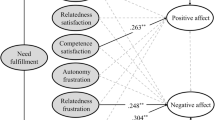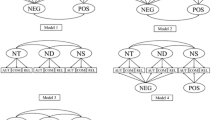Abstract
The present research assessed the psychometric multidimensionality and criterion-related validity the Interpersonal Behaviours Questionnaire using the bifactor-exploratory structural equation modeling framework. Study 1 relied on a sample of 772 participants, and supported the superiority of a bifactor-ESEM representation compared to alternative representations. Ratings of need supportive and thwarting behaviors simultaneously reflected a global overarching need nurturing behaviors construct (rather than two separate need supportive and need thwarting behaviors), which co-existed with six specific dimensions (autonomy, competence, and relatedness need supportive and thwarting behaviors). These results were replicated in a second independent sample of 742 participants and across gender. Our findings supported the criterion-related validity of interpersonal behaviors in relation to positive affect, negative affect, and need fulfillment across samples and genders. We finally discuss the theoretical and practical implications of relying on the bifactor-ESEM framework when investigating need supportive and thwarting interpersonal behaviors.
Similar content being viewed by others
Notes
For comparison purposes, we also estimated higher-order CFA and ESEM models matching the bifactor solutions. All of these higher-order models demonstrated worse model fit when compared to their bifactor counterparts, and models including two higher-order factors also converged on very high estimates of the correlation between the two higher-order factors. Fit indices associated with these higher-order models are provided in Table S11.
References
Asparouhov, T., Muthén, B., & Morin, A. J. S. (2015). Bayesian structural equation modeling with cross-loadings and residual covariances. Journal of Management, 41, 1561–1577.
Bartholomew, K., Ntoumanis, N., & Thorgenson-Ntoumani, C. (2009). A review of controlling motivational strategies from a self-determination theory perspective: Implications for sports coaches. International Review of Sport and Exercise Psychology, 2, 215–233.
Bartholomew, K. J., Ntoumanis, N., Ryan, R. M., Bosch, J. A., & Thøgersen-Ntoumani, C. (2011a). Self-determination theory and diminished functioning: The role of interpersonal control and psychological need thwarting. Personality and Social Psychology Bulletin, 37, 1459–1473.
Bartholomew, K. J., Ntoumanis, N., Ryan, R. M., & Thøgersen-Ntoumani, C. (2011b). Psychological need thwarting in the sport context: Assessing the darker side of athletic experience. Journal of Sport and Exercise Psychology, 33, 75–102.
Beaton, D. E., Bombardier, C., Guillemin, F., & Ferraz, M. B. (2000). Guidelines for the process of cross-cultural adaptation of self-report measures. Spine, 25, 3186–3191.
Bhavsar, N., Ntoumanis, N., Quested, E., Gucciardi, D. F., Thøgersen-Ntoumani, C., Ryan, R. M., Reeve, J., Sarrazin, P., & Bartholomew, K. J. (2019). Conceptualizing and testing a new tripartite measure of coach interpersonal behaviors. Psychology of Sport and Exercise, 44, 107–120.
Bhavsar, N., Bartholomew, K.J., Quested, E., Gucciardi, D.F., Thøgersen-Ntoumani, C., Reeve, J. ... Ntoumanis, N. (2020). Measuring psychological need states in sport: Theoretical considerations and a new measure. Psychology of Sport and Exercise, 47, 101617.
Chen, F. F. (2007). Sensitivity of goodness of fit indexes to lack of measurement invariance. Structural Equation Modeling, 14, 464–504.
Chen, B., Vansteenkiste, M., Beyers, W., Boone, L., Deci, E.L., Van der Kaap-Deeder, J. ... Ryan, R.M. (2015). Basic psychological need satisfaction, need frustration, and need strength across four cultures. Motivation and Emotion, 39, 216–236.
Cheung, G. W., & Rensvold, R. B. (2002). Evaluating goodness-of-fit indexes for testing measurement invariance. Structural Equation Modeling, 9, 233–255.
Deci, E. L., & Ryan, R. M. (2000). The" what" and" why" of goal pursuits: Human needs and the self-determination of behavior. Psychological Inquiry, 11, 227–268.
Dysvik, A., Kuvaas, B., & Gagné, M. (2013). An investigation of the unique, synergistic and balanced relationships between basic psychological needs and intrinsic motivation. Journal of Applied Social Psychology, 43, 1050–1064.
Enders, C. K. (2010). Applied missing data analysis. New York: Guilford.
Gillet, N., Fouquereau, E., Forest, J., Brunault, P., & Colombat, P. (2012). The impact of organizational factors on psychological needs and their relations with well-being. Journal of Business and Psychology, 27, 437–450.
Gillet, N., Morin, A. J. S., Huyghebaert, T., Burger, L., Maillot, A., Poulin, A., & Tricard, E. (2017). University students' need satisfaction trajectories: A growth mixture analysis. Learning and Instruction, 60, 275–285. https://doi.org/10.1016/j.learninstruc.2017.11.003.
Gyollai, Á., Simor, P., Köteles, F., & Demetrovics, Z. (2011). Psychometric properties of the Hungarian version of the original and the short form of the positive and negative affect schedule (PANAS). Neuropsychopharmacologia Hungarica, 13, 73–79.
Herzberg, F. (1964). The motivation-hygiene concept and problems of manpower. Personnel Administrator, 27, 3–7.
Howard, J. L., Gagné, M., Morin, A. J. S., & Forest, J. (2018). Using bifactor exploratory structural equation modeling to test for a continuum structure of motivation. Journal of Management, 44, 2638–2664.
Jones, R., Armour, K., & Potrac, P. (2004). Sports coaching cultures. London: Routledge.
Litalien, D., Morin, A. J. S., Gagné, M., Vallerand, R. J., Losier, G. F., & Ryan, R. M. (2017). Evidence of a continuum structure of academic self-determination: A two-study test using a bifactor-esem representation of academic motivation. Contemporary Educational Psychology, 51, 67–82.
Mai, Y., Zhang, Z., & Wen, Z. (2018). Comparing exploratory structural equation modeling and existing approaches for multiple regression with latent variables. Structural Equation Modeling, 25, 737–479.
Marsh, H. W., Hau, K.-T., & Grayson, D. (2005). Goodness of fit evaluation in structural equation modeling. In A. Maydeu-Olivares & J. McArdle (Eds.), Contemporary psychometrics. A Festschrift for Roderick P. McDonald. Mahwah: Erlbaum.
Marsh, H., Morin, A. J. S., Parker, P., & Kaur, G. (2014). Exploratory structural equation modeling: An integration of the best features of exploratory and confirmatory factor analysis. Annual Review of Clinical Psychology, 10, 85–110.
McDonald, R. P. (1970). Theoretical foundations of principal factor analysis, canonical factor analysis, and alpha factor analysis. The British Journal of Mathematical and Statistical Psychology, 23, 1–21.
Mellor, D., Stokes, M., Firth, L., Hayashi, Y., & Cummins, R. (2008). Need for belonging, relationship satisfaction, loneliness, and life satisfaction. Personality & Individual Differences, 45, 213–218.
Millsap, R. E. (2011). Statistical approaches to measurement invariance. New York: Taylor & Francis.
Morin, A. J. S., Arens, A., & Marsh, H. (2016a). A bifactor exploratory structural equation modeling framework for the identification of distinct sources of construct-relevant psychometric multidimensionality. Structural Equation Modeling, 23, 116–139.
Morin, A. J. S., Boudrias, J.-S., Marsh, H. W., Madore, I., & Desrumaux, P. (2016b). Further reflections on disentengling shape and level effects in person-centered analyses: An illustration exploring the dimensionality of psychological health. Structural Equation Modeling, 23, 438–454.
Morin, A. J. S., Boudrias, J.-S., Marsh, H. W., McInerney, D. M., Dagenais-Desmarais, V., Madore, I., & Litalien, D. (2017). Complementary variable- and person-centered approaches to the dimensionality of psychometric constructs: Application to psychological wellbeing at work. Journal of Business and Psychology, 32, 395–419.
Morin, A.J.S., Myers, N.D., & Lee, S. (2018). Modern factor analytic techniques: Bifactor models, exploratory structural equation modeling (ESEM) and bifactor-ESEM. In G. Tenenbaum & R. C. Eklund (Eds.), Handbook of sport psychology (4th ed). Wiley.
Muthén, L. K., & Muthén, B. (2017). Mplus user’s guide (8th ed.). Los Angeles: Muthén & Muthén.
Myers, N. D., Martin, J. J., Ntoumanis, N., Celimli, S., & Bartholomew, K. J. (2014). Exploratory bifactor analysis in sport, exercise, and performance psychology: A substantive-methodological synergy. Sport Exercise and Performance Psychology, 3, 258–272.
Niemiec, C. P., Lynch, M. F., Vansteenkiste, M., Bernstein, J., Deci, E. L., & Ryan, R. M. (2006). The antecedents and consequences of autonomous self-regulation for college: A self-determination theory perspective on socialization. Journal of Adolescence, 29, 761–775.
Pashler, H., & Wagenmakers, E. J. (2012). Editors’ introduction to the special section on replicability in psychological science. Perspectives on Psychological Science, 7, 528–530.
Perreira, T. A., Morin, A. J. S., Hebert, M., Gillet, N., Houle, S., & Berta, W. (2018). The short form of the workplace affective commitment multidimensional questionnaire (WACMQ-S): A bifactor-ESEM approach among healthcare professionals. Journal of Vocational Behavior, 106, 62–83.
Pulido, J. J., Sánchez-Oliva, D., Leo, F. M., Sánchez-Cano, J., & García-Calvo, T. (2018). Development and validation of coaches’ interpersonal style questionnaire. Measurement in Physical Education and Exercise Science, 22, 25–37.
Reise, S. P. (2012). The rediscovery of bifactor measurement models. Multivariate Behavioral Research, 47, 667–696.
Rocchi, M., Pelletier, L., Cheung, S., Baxter, D., & Beaudry, S. (2017a). Assessing need-supportive and need-thwarting interpersonal behaviours: The interpersonal Behaviours questionnaire (IBQ). Personality and Individual Differences, 104, 423–433.
Rocchi, M., Pelletier, L., & Desmarais, P. (2017b). The validity of the interpersonal behaviors questionnaire (IBQ) in sport. Measurement in Physical Education and Exercise Science, 21, 15–25.
Rodrigues, F., Pelletier, L., Neiva, H.P., Teixeira, D.S., Cid, L., & Monteiro, D. (2019). Initial validation of the Portuguese version of the interpersonal behavior questionnaire (IBQ & IBQ-self) in the context of exercise: Measurement invariance and latent mean differences. Current Psychology, 1–12.
Ryan, R. M., & Deci, E. L. (2017). Self-determination theory. In Basic psychological needs in motivation, development, and wellness. New York: Guildford Press.
Sánchez-Oliva, D., Morin, A. J. S., Teixeira, P. J., Carraça, E. V., Palmeira, A. L., & Silva, M. N. (2017). A bifactor-exploratory structural equation modeling representation of the structure of basic psychological needs at work scale. Journal of Vocational Behavior, 98, 173–187.
Sheldon, K. M., & Filak, V. (2008). Manipulating autonomy, competence, and relatedness support in a game-learning context: New evidence that all three needs matter. British Journal of Social Psychology, 47, 267–283.
Sheldon, K. M., & Niemiec, C. P. (2006). It's not just the amount that counts: Balanced need satisfaction also affects well-being. Journal of Personality and Social Psychology, 91, 331–341.
Skrondal, A., & Laake, P. (2001). Regression among factor scores. Psychometrika, 66, 563–575.
Stenling, A., Ivarsson, A., Hassmén, P., & Lindwall, M. (2015). Using bifactor exploratory structural equation modeling to examine global and specific factors in measures of sports coaches' interpersonal styles. Frontiers in Psychology, 6, 1303.
Tóth-Király, I., Morin, A. J. S., Bőthe, B., Orosz, G., & Rigó, A. (2018). Investigating the multidimensionality of need fulfillment: A bifactor exploratory structural equation modeling representation. Structural Equation Modeling, 25, 267–286.
Valtorta, N. K., Kanaan, M., Gilbody, S., Ronzi, S., & Hanratty, B. (2016). Loneliness and social isolation as risk factors for coronary heart disease and stroke: Systematic review and meta-analysis of longitudinal observational studies. Heart, 102, 1009–1016.
Vansteenkiste, M., & Ryan, R. M. (2013). On psychological growth and vulnerability: Basic psychological need satisfaction and need frustration as a unifying principle. Journal of Psychotherapy Integration, 23, 263–280.
Watson, D., Clark, L. A., & Tellegen, A. (1988). Development and validation of brief measures of positive and negative affect. Journal of Personality and Social Psychology, 54, 1063–1070.
Acknowledgements
The first author was supported in the preparation of the manuscript by a Horizon Postdoctoral Fellowship from Concordia University and by the ÚNKP-17-3 New National Excellence Program of the Ministry of Human Capacities from Eötvös Loránd University. The second author was supported by a grant from the Social Sciences and Humanities Research Council of Canada (435-2018-0368). The fourth author was supported by a postdoctoral fellowship from the SCOUP Team – Sexuality and Couples – Fonds de recherche du Québec, Société et Culture. The seventh author was supported by the Hungarian Research Fund (NKFI FK 124225). The previous version of this paper was written while the first author was doing his PhD studies at Eötvös Loránd University.
Author information
Authors and Affiliations
Corresponding author
Ethics declarations
Conflict of Interest
All authors declare that they have no conflict of interest.
Additional information
Publisher’s Note
Springer Nature remains neutral with regard to jurisdictional claims in published maps and institutional affiliations.
Electronic supplementary material
ESM 1
(DOCX 61 kb)
Rights and permissions
About this article
Cite this article
Tóth-Király, I., Morin, A.J., Gillet, N. et al. Refining the assessment of need supportive and need thwarting interpersonal behaviors using the bifactor exploratory structural equation modeling framework. Curr Psychol 41, 2998–3012 (2022). https://doi.org/10.1007/s12144-020-00828-8
Published:
Issue Date:
DOI: https://doi.org/10.1007/s12144-020-00828-8




